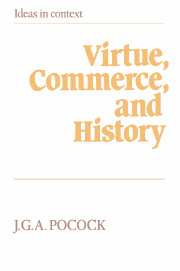 Virtue, Commerce, and History
Virtue, Commerce, and History Published online by Cambridge University Press: 05 May 2010
Early in 1946, an assistant lecturer and a lecturer in history found themselves sharing an office, as it would now be called, of Victorian granite and fiberboard partitions, forming part of what had been a gallery running above the archway of the Rolleston Avenue entrance to the old buildings of what was then Canterbury University College in the University of New Zealand. Both were newly appointed to their duties, the one just graduated and the other just returned from the wars. Between them, they increased the teaching members of their department from two to four. Both were men of independent personality who came to think it a matter of credit to each that they shared their quarters so cordially. In time, however, their ways parted. The assistant lecturer went in pursuit of a doctorate and entered upon a complex orbit that was to pass through Canterbury's gravitational field again. The lecturer, a more stable and powerful luminary unafraid of dog days, remained to become a professor of history and in due course vicechancellor of the University of Canterbury in the times of its centennial and its migration to a new campus. Under whatever signs are now in the ascendant, the assistant lecturer offers the lecturer an essay upon a subject, and related to a personality, both of which have always meant much to him.
To save this book to your Kindle, first ensure [email protected] is added to your Approved Personal Document E-mail List under your Personal Document Settings on the Manage Your Content and Devices page of your Amazon account. Then enter the ‘name’ part of your Kindle email address below. Find out more about saving to your Kindle.
Note you can select to save to either the @free.kindle.com or @kindle.com variations. ‘@free.kindle.com’ emails are free but can only be saved to your device when it is connected to wi-fi. ‘@kindle.com’ emails can be delivered even when you are not connected to wi-fi, but note that service fees apply.
Find out more about the Kindle Personal Document Service.
To save content items to your account, please confirm that you agree to abide by our usage policies. If this is the first time you use this feature, you will be asked to authorise Cambridge Core to connect with your account. Find out more about saving content to Dropbox.
To save content items to your account, please confirm that you agree to abide by our usage policies. If this is the first time you use this feature, you will be asked to authorise Cambridge Core to connect with your account. Find out more about saving content to Google Drive.